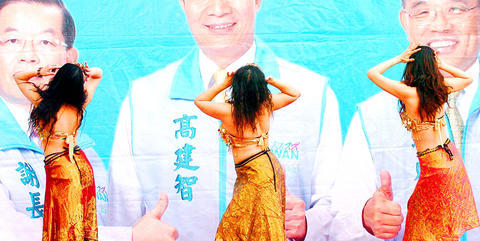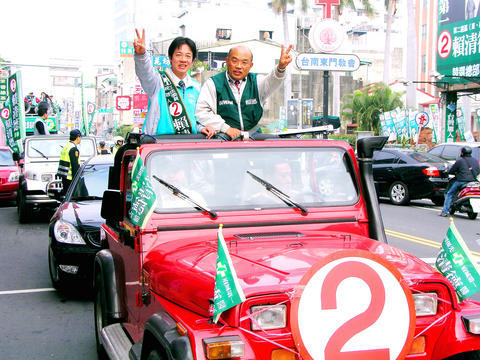With the legislative election battle reaching boiling point with less than a week to go, Democratic Progressive Party (DPP) and Chinese Nationalist Party (KMT) "big guns" engaged in non-stop campaigning around the country yesterday to stump for their prospective legislative candidates.
President Chen Shui-bian (陳水扁), who doubles as DPP chairman, was shaking hands and working the crowd in Taoyuan, Taichung and Miaoli yesterday morning. He then showed up at campaign rallies in Chunghua in the evening.
Other pan-green heavyweights such as DPP presidential candidate Frank Hsieh (謝長廷), his running mate Su Tseng-chang (蘇貞昌) and Vice President Annette Lu (呂秀蓮) also criss-crossed the nation stumping for their party's legislative hopefuls.

PHOTO: CHANG CHIA-MING, TAIPEI TIMES
The pan-blue camp's big guns also spent the last Sunday before the legislative poll on Saturday gearing up support for the KMT's legislative candidates.
Former KMT chairman Lien Chan (連戰), who had not made many public appearances recently, has been on a tight campaign schedule for the past few days. He campaigned yesterday for five candidates in Pingtung and Kaohsiung, constituencies which are considered DPP strongholds.
KMT presidential candidate Ma Ying-jeou (

PHOTO: HUANG PO-LANG, TAIPEI TIMES
Later yesterday, Ma was at a campaign rally in Kaohsiung County while KMT Chairman Wu Poh-hsiung (吳伯雄) was campaigning for a KMT candidate in Chiayi.
Ma said candidates from all around the nation had urged him to campaign for them ahead of the election.
KMT legislative caucus leader Kuo Su-chun (郭素春), an at-large candidate in this year's race, has been attending rallies around the country for fellow KMT candidates and said appearances by Ma have been an asset to their campaigns.
While candidates could judge for themselves how many votes the big names would be worth in their constituencies, Kuo said that from her experience "most KMT candidates believe the charismatic Ma appeals to the voters and they want to capitalize on it."
Lin Tsang-min (林滄敏), an incumbent KMT lawmaker locked in a tight battle in Changhua County, was one of those hoping to benefit from Ma's presence.
He said he has found that his campaign gets a real boost when Ma arrives in the county and stumps on his behalf.
Leveraging support from "Mr or Ms Popular" is becoming one of the most favored campaign tactics in this election. The "populars" are the political stars seen to be capable of livening up campaign platform presentations, fueling election battles and adding votes for the candidates they support.
For the pan-green camp, Government Information Office Minister Shieh Jhy-wey (謝志偉) is considered the most effective "Mr Popular."
DPP Legislator Chuang Suo-hang (
Chuang's comments were echoed by DPP Legislator Sandy Yen (
Other pan-green "populars" include Hsieh, Su and former vice premier Tsai Ing-wen (
Among them, Hsieh's quick wit and humor is quite popular with the candidates, making him the runner-up behind Shieh, Chuang said. President Chen and Kaohsiung Mayor Chen Chu (陳菊) are also popular star campaigners for their high fame and strong speeches, Chuang added.
DPP Legislator Tsai Chi-chang (
But not all candidates favored the political stars as their campaign stumpers.
DPP Legislator Huang Chao-hui (
Three years ago, when Huang ran for legislator, Chen Ling-li promised voters she would devote her full attention to helping her husband and give up her seat on the council should Huang be elected, Huang said.
To this day, Chen Ling-li's grassroots work with the voters during her term as councilor still offers Huang tremendous help, for which he is extremely grateful, he said.
KMT Legislator Shyu Jong-shyoung (徐中雄), who is seeking re-election in Taichung County, also said that he did not need the help of a star campaigner. Of course, he may feel a little less pressure -- the DPP failed to nominate anybody to oppose him.
One KMT candidate, who asked to remain anonymous, said he did not want party heavyweights campaigning by his side because they would manipulate partisan divisions and emphasize the "pan-green" versus "pan-blue" divide.
There were also mixed feelings in the pan-green camp toward having the big names appear on stage.
Under the old system of multi-representative districts, appealing to one's core support base was sufficient to win a seat. In this year's legislative polls, however, candidates are generally engaged in two-horse races where independent voters could decide their fates. They were voters who were likely to be less impressed by the endorsement of party heavyweights engaging in partisan rhetoric.
DPP candidate Huang Wei-cher (黃偉哲), in a tight race against incumbent Non-Partisan Solidarity Union candidate Lee He-shun (李和順) in Tainan County, felt that with the DPP's historical strength in southern Taiwan, President Chen and other party heavyweights should attend more rallies there in order to energize the DPP's core support base.
Huang said he did not worry that the president's speeches might drive away centrist voters because he had plenty of campaigning experience and knew what he should or should not say.
On the other hand, incumbent DPP lawmaker Chiu Chuang-chin (
Chiu said star campaigners were useful in boosting a campaign team's morale, intimidating opponents and giving voters the impression that the candidate had a wide range of supporters, but that they do not necessarily win more votes.
Additional reporting by Ko Shu-ling and Flora Wang

The CIA has a message for Chinese government officials worried about their place in Chinese President Xi Jinping’s (習近平) government: Come work with us. The agency released two Mandarin-language videos on social media on Thursday inviting disgruntled officials to contact the CIA. The recruitment videos posted on YouTube and X racked up more than 5 million views combined in their first day. The outreach comes as CIA Director John Ratcliffe has vowed to boost the agency’s use of intelligence from human sources and its focus on China, which has recently targeted US officials with its own espionage operations. The videos are “aimed at

STEADFAST FRIEND: The bills encourage increased Taiwan-US engagement and address China’s distortion of UN Resolution 2758 to isolate Taiwan internationally The Presidential Office yesterday thanked the US House of Representatives for unanimously passing two Taiwan-related bills highlighting its solid support for Taiwan’s democracy and global participation, and for deepening bilateral relations. One of the bills, the Taiwan Assurance Implementation Act, requires the US Department of State to periodically review its guidelines for engagement with Taiwan, and report to the US Congress on the guidelines and plans to lift self-imposed limitations on US-Taiwan engagement. The other bill is the Taiwan International Solidarity Act, which clarifies that UN Resolution 2758 does not address the issue of the representation of Taiwan or its people in

US Indo-Pacific Commander Admiral Samuel Paparo on Friday expressed concern over the rate at which China is diversifying its military exercises, the Financial Times (FT) reported on Saturday. “The rates of change on the depth and breadth of their exercises is the one non-linear effect that I’ve seen in the last year that wakes me up at night or keeps me up at night,” Paparo was quoted by FT as saying while attending the annual Sedona Forum at the McCain Institute in Arizona. Paparo also expressed concern over the speed with which China was expanding its military. While the US

SHIFT: Taiwan’s better-than-expected first-quarter GDP and signs of weakness in the US have driven global capital back to emerging markets, the central bank head said The central bank yesterday blamed market speculation for the steep rise in the local currency, and urged exporters and financial institutions to stay calm and stop panic sell-offs to avoid hurting their own profitability. The nation’s top monetary policymaker said that it would step in, if necessary, to maintain order and stability in the foreign exchange market. The remarks came as the NT dollar yesterday closed up NT$0.919 to NT$30.145 against the US dollar in Taipei trading, after rising as high as NT$29.59 in intraday trading. The local currency has surged 5.85 percent against the greenback over the past two sessions, central